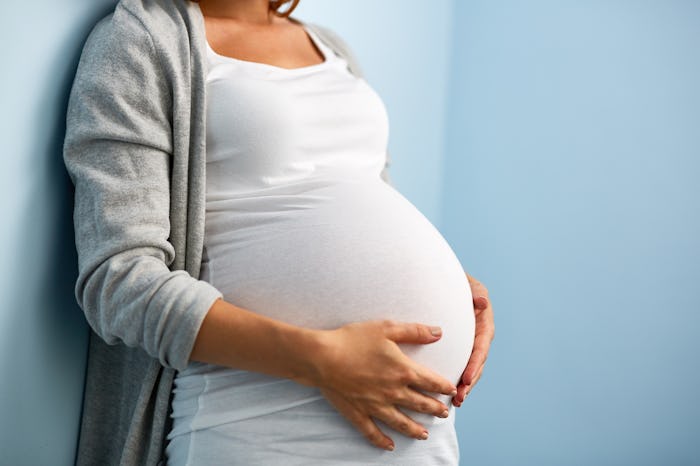Life
Pregnant Women With Anemia Face A Higher Risk Of Maternal Death — Here's What You Need To Know
It's hard to wrap your head around the fact that maternal mortality is still such a prevalent issue in the United States and across the globe. But unfortunately, there's still a lot of research to be done on the issue and how to prevent it. A new study published Tuesday in the British medical journal The Lancet Global Health, found that pregnant women with anemia face a higher risk of maternal death. That's frustrating and pretty unacceptable when you consider the fact that anemia is totally preventable, as reported by CNN.
There are a few different types of anemia, which basically means that your body has a "lower-than-normal amount of red blood cells," according to the National Heart, Lung, and Blood Institute. Red blood cells are what pushes oxygen from your lungs to the rest of your body. It can make you feel tired, weak, and cause headaches, shortness of breath, dizziness, and even an irregular heartbeat.
Mild anemia is really common, and just means that you're not getting enough iron and other vitamins, which is usually what doctors prescribe to people who show symptoms. (However, there are also other more serious conditions that can cause lower red blood cells like kidney disease, cancer, or autoimmune diseases.)
Women on their periods or are pregnant are at higher risk for mild anemia, which is why it's so important for women to be checking in with their doctor and taking prenatal vitamins to prevent it.
According to the World Health Organization, doctors and researchers have also assumed that there might be a link between anemia and maternal mortality, but the data has never been definitive. This study, however, seems to have found a solid link between the condition and maternal death.
The study drew from World Health Organization data from 29 countries in Latin America, Africa, Western Pacific, Eastern Mediterranean, and South East Asia. They examined 312,281 pregnancies in which 4,189 cases of anemia were identified and of those cases, there were 341 deaths of anemic women. There were 341 deaths out of those anemic cases, with lower-income women in developing countries included in the study being all the more vulnerable. But that doesn't mean that maternal mortality doesn't happen everywhere in the world.
The WHO reports that 99 percent of all maternal deaths occur in developing countries. Nigeria and India, for example, accounted for one third of all maternal deaths in 2015, according to the organization. But it happens to American women, too, who live in rural and poor communities where the maternal mortality rate is the highest in the developed world, with 26.4 deaths per 100,000 live births, according to NPR. (For comparison sake, the second highest rate in the developed world is 9.2 deaths per 100,000 live births in the United Kingdom, according to the same report.)
Jahnavi Daru, lead study author and a doctoral research fellow at Queen Mary University of London, said in a statement to Medical Xpress:
Anemia in pregnancy is one of the most common medical problems pregnant women encounter both in low and high income countries. We've now shown that if a woman develops severe anaemia at any point in her pregnancy or in the seven days after delivery, she is at a higher risk of dying, making urgent treatment even more important.
"Anemia is a readily treatable condition but the existing approaches so far have not been able to tackle the problem. Clinicians, policy makers and healthcare professionals should now focus their attention on preventing anaemia, using a multifaceted approach, not just hoping that iron tablets will solve the problem," she added.
Daru told CNN that it's not a problem that can be solved by simply giving iron supplements to pregnant women. She said, "We often think giving the iron tablets will solve the problem. Providing iron tablets has been happening for 50-odd years now, but this is still a problem."
Instead, she explained, "a lot of it comes down to how health care services are set up. Are women delivering in areas where there are trained attendants who can treat them? Are they even aware that anemia is a common problem?"
In both the United States and in other countries, it's up to governments to make sure that women have access to food security and health care before, during, and after their pregnancies. This study shows that there is a strong link between anemia and maternal mortality, which means there's all the more reason to start demanding legislators and health officials do something about it.
Check out Romper's new video series, Bearing The Motherload, where disagreeing parents from different sides of an issue sit down with a mediator and talk about how to support (and not judge) each other’s parenting perspectives. New episodes air Mondays on Facebook.
This article was originally published on
